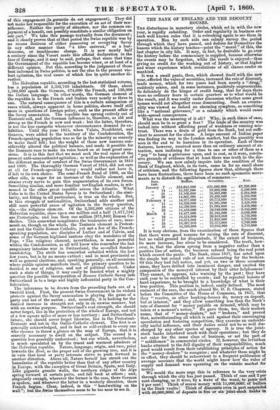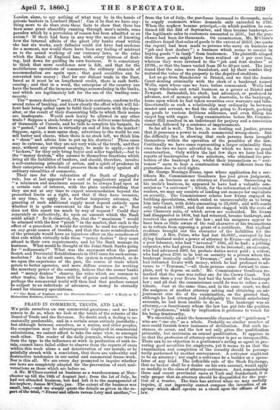THE BANK OF ENGLAND AND THE DISCOUNT HOUSES.
THE disturbance in monetary circles, which set in with the new year' is rapidly subsiding. Order and regularity in business are such well known rules that it is refreshing again to see them in operation. Men by such aids can calmly survey the period through which they have passed, and deduce for themselves the lessons which the history teaches—point the "moral" of this, the last chapter in city life. It may, in fact, be desirable to go over the history before the commentary is supplied, because otherwise the events may be forgotten while the result is enjoyed—thus giving. no credit for the working out of history, or that higher and wiser experience which revolutions of all classes confer on mankind.
It was a small panic then, which showed itself with the new year, affected the value Of securities, increased the rate of discount, made money, which for two years had been nearly a "drug," suddenly scarce, and in some instances, positively unprocurable. So delicately do the hinges of credit hang, that for days there were no ordinary fears in certain quarters as to what would be the result, and it was really under discussion whether some great houses would not altogether cease discounting. Such an eventu- ality was viewed as indeed an alarming symptom, as something like a "national grievance," or a calamity which would cause wide-spread consequences. What was the meaning of it all ? Why, in such times of ease, should men be in so great a fear ? The trade of the country was looked into without affording proof of weaknass or causing mis- trust. There was a drain of gold from the Bank, but not suffi- cient to account for the alarm. A large amount of Indian paper was finding its way to the London market, but the quantity was seen in the end to be harmless in its operation. Each of these features, however, received more than an ordinary amount of at- tention, men inclining for a time to one or other of them as a " peg " to hang a grievance upon, and to rest, as it were, conclu- sive grounds of evidence that at least there was truth in the dis- covery. We can now calmly inquire into the condition of the Bank of England, which, in its turn, came in for no small share of criticism, and the following figures show that, although there have been fluctuations, there have been no such spasmodic move- ments as to disturb the equilibrium of commerce
Date. Bullion. Securities. 1860. Best.
january 7 ..
£15,815,000 .. £21,092,000 .. £3,209,000
77 14 ..
16,527,000 .. 19,892,000 .. 3,250,000
71 21 ..
15,168,000 .. 19,593,000 .. 8,284,000 , 28 .. 14,867,000 .. 19,499,000 .. 3,295,000 , February 4 .. 14,277,000 .. 20,773,000 .. 3,324,000
PI 11
14,328,000 .. 21,061,000 .. 3,420,000
/1 18 ..
14,389,000 .. 21,084,000 .. 3,438,000 ( „ 26 .. 14,453,000 .. 20,940,000 .. 3,446,000 March 3 .. 14,477,000 .. 21,164,000 .. 3,680,000 „ 10 .. 14,514,000 .. 20,953,000 .. 3,722,000
Of 17 ..
14,574,000 .. 21,816,000
3,732,000
77 24 ..
14,587,000 .. 22,575,000 .. 3,740,000 )1 31 .. 14,588,000 .. 23,955,000 .. 3,755,000
It is very obvious, from the examination of these, figures that that there were good reasons for raising the rate of discount, but no valid ground for disquietude, if the extent of business, its mere increase, has alone to be considered. The truth, how- ever, is, that the alarm sprung from a negative rather than a positive line of action, the business refused being the real point which caused the panic. The Bank, since 1857, has acted upon the simple but sound rule of not rediscounting for the brokers. Of this they had full notice, and yet, on two or three occasions since, they have drifted into imminent danger, and excited the compassion of the moneyed interest by their utter helplessness ! They cannot, it appears, take warning by the past ; they have each year to be controlled by events ; and by repeated lessons of hard experience, to be brought to a knowledge of what is their true position. This position is, indeed, easily defined. The most eminent of the race the much abused Mr. D. B. Chapman, stated before the Committee of the House of Commons, in 1857, that they "receive, as other banking-houses do, money on deposit, but at interest," and they allow something less than the Bank's rate of discount for " money payable on demand, which may be taken at a moment's notice." He gave them, too, their modern name, that of "money-dealers," not "brokers," and proved that, notwithstanding all which is said against their encouraging speculation and fostering competition, they exercise an undoubt- edly useful influence, and their duties could not be so well dis- charged by any other species of agency. It is true the joint- stock banks interfered much with their operations ; but they do not cater for the same class of business, or act the part ..of "middlemen" in commercial circles. If, however, the leviathan banks attained to the „full dignity of their responsibilities, much good would result from their establishing principles of action for the " money-dealers " to recognize ; and whatever these might be in effect, they should be subservient to a frequent publication of average accounts that the world might know how the rules of supply and demand were operating on the outside market for money.
We would the more urge this in reference to the very crisis through which the city has just passed. Think of ease and 2 per cent changing, as it were, by a wave of the wand, to panic and 4 per cent ! Think of scarce money with 15,000,0001. of bullion in the Bank vaults Think of discounts even in part sugpended with 40,000,0001. of deposits in five or six joint-stock banks in
'London alone, to say nothing of what may be in the hands of private bankers in Lombard Street ! Can it be that we have any- thing more to do than state these facts to show that there has been some great absurdity running through men's minds, some paradox which by a perversion of reason has been admitted as an axiom ? If there had been in any way the means of knowing how the internal affairs of the great city banks stood within the last six weeks, such fallacies could not have had credence for a moment, nor would there have been any feeling of mistrust as to the sound working of our currency laws, or the rules which the Bank of England has, with every fairness of deal- ing, laid down for guiding its own business. It is consolatory to think that more confidence now is felt, and that for the multifarious operations of commerce, he ordinary channels of accommodation are again open ; that good securities can be converted into money ; that for our distant trade in the East, based as it must be on lengthened credit, there is cash forth- coming ; and that in a word, the enterprise of the country can have the benefit of the immense savings accumulating in the banks, and which are legitimately left for the use of the trading com- munity. The money dealers" must, if this is to continue, conform to the sound rules of banking, and know clearly the effect which will fol- lowt heir being called upon to fulfil their contracts with the depo- sitor, or the result of their discounting bills to which their means are inadequate. Would such laxity be allowed in any other trade ? Suppose a stock-broker engaging to deliver some hundreds of thousands of Consols, and he fails to complete his bargain, he is "posted," and there is virtually an end of him in the market ! Suppose, again, a man opens shop, advertises to the world he can sell butter and cheese, when there is no stock left, we think him a "sham" and advise him to put up his shutters ! These cases may be extreme, but they are not very wide of the truth, and they may, without any strained analogy, be made to apply,—not to "brokers," for they only bring buyer and seller together,—but to the "money dealers," who assume to themselves functions which bring all the liabilities of bankers, and should, therefore, involve a self-containing principle of action, and a spirit of prudence in their enterprises which would preserve them in safety against all ordinary easualities of commerce. Their case for the relaxation of the Bank of England's rule, has at last appeared* in a sort of supplicatory appeal for "a minimum and maximum amount to be always kept open at a certain rate of interest, with the plain understanding that they are not at any time to expect accommodation beyond the prescribed limits as a right, and that if they have occasion, at any time, to apply for a further temporary advance, the granting of such additional supply must depend entirely upon whether it is quite convenient to the Bank to do so." But does not this assert too much by way of request ? Could they separately or collectively, fix upon an amount which the Bank tould admit ? Be it observed, too, that the " maximum" would be attained with the first " pinoh " in the market, that such is the effect of a precedent, it would for certain be used too vigorously on any great season of trouble, and that the mere reintroduction of the principle would have an injurious effect on the soundness of that rule which virtually tells these "money dealers" .they must attend to their own requirements' and let the Bank manage its business. What would be thought of the Joint Stock Banks going for " rediscounts ?" What was the argument when the great Scotch and Provincial Establishments in 1847 came for such accom- modation? As in all such cases, the system is reprobated, so do we upon the experience of the past, the course of trade which points to better agencies, and more diffuse sources for working the monetary power of the country, believe that the sooner banks and "money dealers" observe the rules which are common to other trades, the less there will be of panic and confusion, and perhaps the commercial world will then find that produce cannot be subject to an infinitude of advances, or money be eternally found for visionary speculations.
• The Bank of England and the Discount-Houses " : and "A Reply to X.' Richardson Brothers, Coralnll.



























 Previous page
Previous page